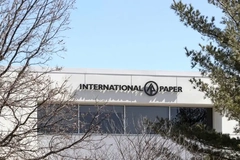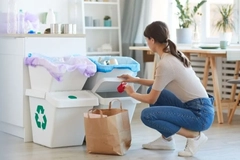EU urged to adopt mass balance fuel-use exempt method to boost chemical recycling

19 Oct 2023 --- In an effort to expedite plastic recycling and meet the EU’s ambitious recycling targets, 20 associations representing various sectors of the plastics supply chain have issued a call to EU member states to adopt a mass balance fuel-use exempt method.
Mass balance is an accounting principle that tracks input and output in recycling or production processes to determine recycled content. Fuel exemption excludes energy used in the process and certain co-products, making it simpler to allocate remaining outputs.
The appeal urges the immediate adoption of the mass balance fuel-use exempt method as the standardized approach for allocating recycled content through chemical recycling. The signatories include notable industry associations like the Alliance for Beverage Cartons and the Environment, the British Plastics Federation, A Circular Economy for Flexible Packaging, Chemical Recycling Europe and The European Association for Packaging and the Environment.
“We ask the commission to urgently adopt a mass balance chain of custody to calculate chemically recycled plastic content. Mass balance is a transparent and auditable method to trace a defined material characteristic along the value chain from material suppliers to consumers,” they write.
“To meet the 2030 recycled content targets, legal certainty on the method is needed this year to ensure sufficient time to plan, finance, secure permits and construct additional recycling units and accompanying infrastructure. Each of these steps can take several years.”
 The associations propose a fuel-use-exempt model, stating that it would establish a robust system compatible with chemical recycling routes.Actionable insights
The associations propose a fuel-use-exempt model, stating that it would establish a robust system compatible with chemical recycling routes.Actionable insights
The appeal underscores the necessity for an EU-harmonized calculation and verification method to allocate recycled content to output products. The associations propose a fuel-use-exempt model, stating that it would establish a robust system compatible with chemical recycling routes, enabling producers and users of recycled content to meet market expectations and comply with EU legislation effectively.
The associations emphasize the significance of third-party verification and certification to maintain credibility throughout the value chain and cultivate consumer trust. They call on the European Commission to utilize the Single-Use Plastic Directive legal basis in 2023 to adopt EU calculating rules enabling a mass balance credit method with a fuel-use exempt model for calculating chemically recycled plastic content.
The signatories stress the importance of clarity and consistency across various legislative frameworks addressing recycled content in plastics and non-plastic chemical materials. Such measures, they argue, would significantly advance the circular economy, enhance the EU’s strategic autonomy in raw materials and support climate targets.
“Mass balance is a transparent and auditable method to trace a defined material characteristic along the value chain from material suppliers to consumers. A mass balance chain of custody is used and accepted in other domains such as sustainable forestry products and fair trade cocoa and chocolate,” reads the letter.
Complementary recycling methods
The 20 trade associations point out that reaching the set targets for 2030 and 2040, as outlined in the proposed EU Packaging and Packaging Waste Regulation, necessitates immediate large-scale investments in chemical recycling, especially since studies suggest member states are at high risk of not achieving plastic packaging recycling targets.
“Recycling efforts across the EU need to be urgently ramped up with a critical need for more investment in recycling and collection infrastructure. While mechanical and other physical recycling technologies will continue to expand and innovate, there is also a unique opportunity for chemical recycling to complement existing efforts to help achieve recycling targets and increase the volume of recycled content.”
They urge policymakers to establish a precedent for when and how a mass balance chain of custody in recycled plastics should be applied within the EU, especially in non-packaging sectors like automotive and construction, where recycled plastics targets are also under discussion.
The associations argue that various recycling methods, including mechanical, physical and chemical, are complementary as they address different feedstocks. “Frequently, recycled feedstocks are blended with virgin feedstocks, and the two different feedstocks cannot be physically separated once they are co-fed into the complex large-scale installations,” they write.
“We recommend a mass balance chain of custody to enable the successful commercialization and promotion of recycled content from technologies where it is needed.” The associations argue that various recycling methods, including mechanical, physical and chemical, are complementary as they address different feedstocks.
The associations argue that various recycling methods, including mechanical, physical and chemical, are complementary as they address different feedstocks.
Recycling debate
The associations caution that other allocation methods, such as polymer-only and proportional allocation, would significantly increase costs and chemical recycling capacity, hindering the achievement of recycled content targets in packaging and other sectors.
This appeal echoes the endorsement of mass balance fuel-use-exempt by 33 European associations earlier this year, emphasizing its potential to drive the scale-up of chemical recycling, increase recycling rates and meet forthcoming mandatory recycled content targets.
But speaking to Packaging Insights previously, Zero Waste Europe’s Chemical Recycling and Plastic-to-Fuels policy officer Lauriane Veillard stressed that national and European policymakers should implement regulations ensuring that mechanical methods remain the primary recycling option for maximum CO2 reduction and circularity score.
The non-profit explained that fuel exemption in mass balance approaches means the industry can freely allocate recycled content to part of its output and, therefore, “does not ensure reliable claims for the consumer.”
By Radhika Sikaria











